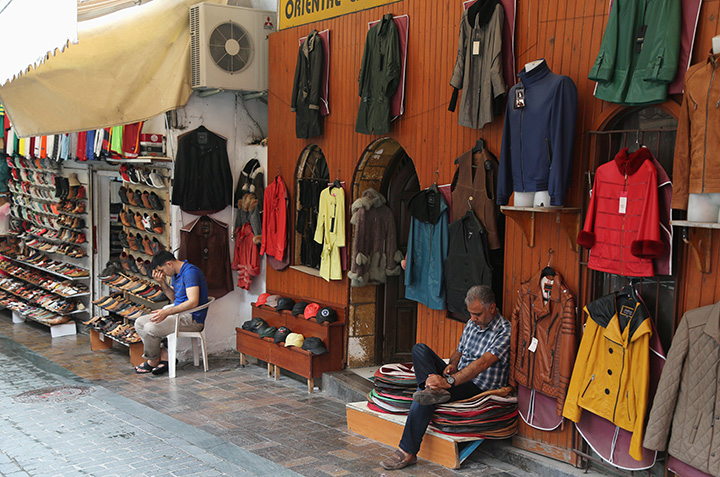 Istanbul is commonly described as a city on two continents. Well, Istanbul’s main airport is now a city of two worlds: its transit halls as full as ever; the arrival areas eerily quiet.
Istanbul is commonly described as a city on two continents. Well, Istanbul’s main airport is now a city of two worlds: its transit halls as full as ever; the arrival areas eerily quiet.
This is the visible side of the collapse of tourism in Turkey, the consequence of bombings in cities and a return to war between the Turkish state and outlawed Kurdish separatists.
Hotels all seem to have rooms available at heavily discounted prices, once-crowded restaurants have empty tables while the entreaties from their staff to come and taste their particular takes on Turkish and international cuisine are more raucous than ever.
It’s not yet a complete disaster, but it might turn out to be. Tourism revenues are expected to decline by around twenty to twenty-five percent this year, effectively costing the country around $8 billion.
The immediate question is whether European, Central Asian, and Arab tourists will flock this summer to their traditional holiday resorts on Turkey’s Aegean and Mediterranean coasts. And will Istanbul itself, one of the world’s greatest tourist magnets, still hold the same level of attraction for the well-heeled traveller, the once-in-a-lifetime tourist, or the backpacker if it gains a reputation as a place where bombs go off?
Most of the Russian traffic has disappeared, a victim of the tension caused by Moscow and Ankara backing different sides in Syria’s civil war epitomized by the incident on November 24 of last year when Turkish fighters shot down a Russian jet over the Turkish-Syrian borderlands.
A report in the Turkish newspaper Hurriyet cited shopkeepers in one southern bazaar saying that sales were down ninety percent since Russian President Vladimir Putin banned Russian charter flights to Turkey, forbade Russian travel agencies from selling package holidays to Turkey, and imposed tough restrictions on imports from Turkey in response to the jet incident.
This writer can confirm that a stroll through Antalya’s usually bustling old port at the end of winter—a time when shops and stalls in the resort city are usually packed with tourists seeking Mediterranean sunshine—was a walk past stalls crammed full of Turkish Delight and holiday knickknacks, but bereft of customers.
Tourism, for Turkey, is a serious business. The Turkish Statistical Institute says Turkey earned $36.46 billion from tourism in 2015. This was down 8.3 percent from 2014 income as visitor numbers fell steadily in the second half of the year.
Last year, Germany, Russia, and the United Kingdom were the top three sources of tourists visiting Turkey. But the number of visitors has fallen since last July—the month when, incidentally, the Turkish state and the Kurdish militants resumed their war. And it is Germans and Russians—and perhaps Brits—who are staying away.
Just as disputes between Ankara and Moscow over Syria have led to the collapse of Russian tourism in Turkey, increasing tensions between Ankara and Berlin over such issues as Turkey’s anti-terrorism legislation, the civilian casualties in the war with the Kurdistan Workers’ Party (PKK), and the particularly fractious issue of whether Ottoman Turkey conducted a genocide against Armenians a century ago have contributed to a falloff in the numbers of German holidaymakers in Turkey.
One of the main reasons for the dip in the number of German tourists was, almost certainly, the fact that twelve German tourists and one Peruvian were killed in a suicide bomb attack on January 12 in the piazza between the Blue Mosque and Hagia Sophia in the heart of Istanbul’s most important tourist district. The attack prompted the German Foreign Ministry to issue a warning to German citizens to avoid crowded places and tourist attractions in Turkey.
On June 7, eleven people died and thirty-six were wounded when a suicide bomber detonated a car bomb in Istanbul. From a tourist perspective, what counted was that the blast took place in a usually pleasant quarter located just a few-minutes-walk from the Süleymaniye Mosque—arguably the most beautiful building of the city’s Ottoman era—from Istanbul University, and from the shopping area of Laleli. And not too far from the Grand Bazaar either.
The British Foreign Office issued a travel advisory in response to the incident. The US State Department has issued recurring warnings against travel to southeastern Turkey and districts adjoining Turkey’s border with Syria.
Tourism plays a prominent role in the Turkish economy. It directly accounts for no less than 4.7 percent of Turkey’s GDP and indirectly for as much as twelve percent, according to the World Travel and Tourism Council. But the current violence stands to weaken the industry. For example, the loss of Russian charter airline tourism has meant the collapse of the “suitcase” trade between the two countries, estimated to have contributed $4.2 billion to Turkish exports in 2014.
Invest in Turkey, the country’s leading investment body, distributed a brochure to tourists at Istanbul’s Ataturk airport describing Turkey as the world’s sixth-most popular tourist destination. It may not hold that position much longer.
John M. Roberts is a nonresident senior fellow at the Atlantic Council’s Dinu Patriciu Eurasia Center.
Image: Shopkeepers wait for customers in the Mediterranean resort city of Antalya, Turkey, on June 3. (Reuters/Kaan Soyturk)
